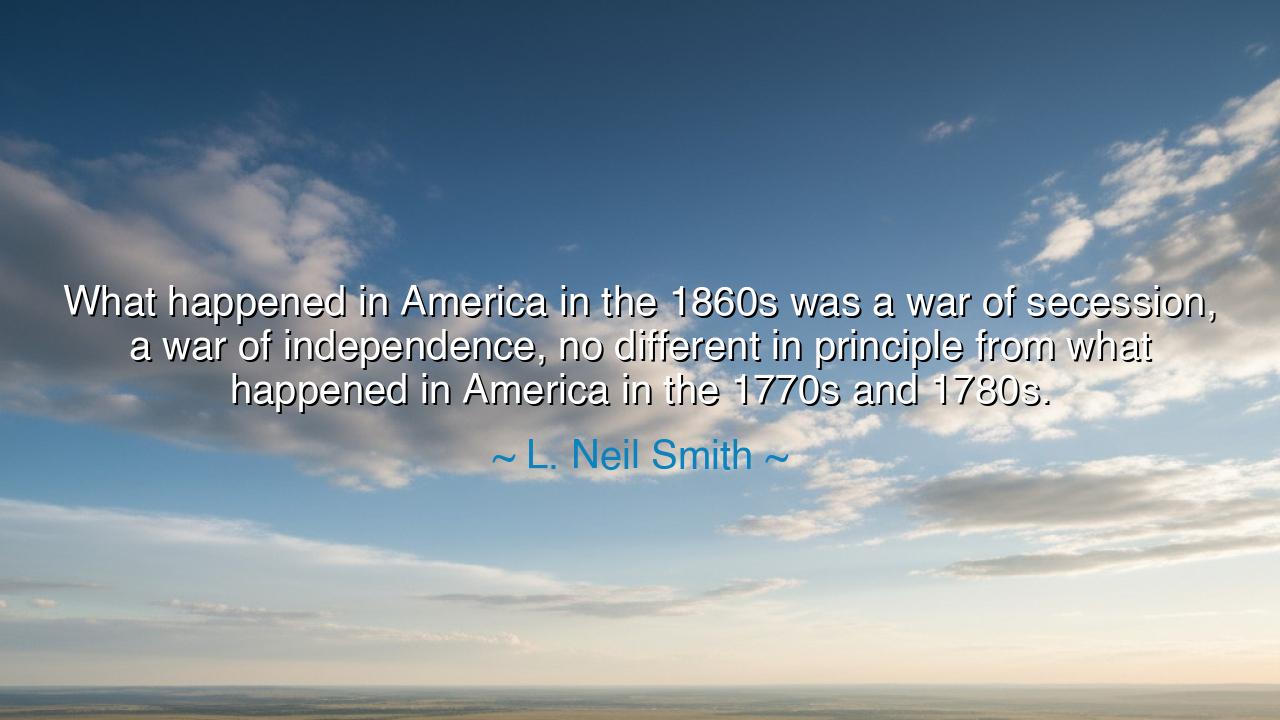
What happened in America in the 1860s was a war of secession, a
What happened in America in the 1860s was a war of secession, a war of independence, no different in principle from what happened in America in the 1770s and 1780s.






The words of L. Neil Smith, both provocative and profound, carry the tone of a man who dares to reexamine history through the lens of principle rather than passion. When he declared, “What happened in America in the 1860s was a war of secession, a war of independence, no different in principle from what happened in America in the 1770s and 1780s,” he spoke not merely of battles or politics, but of the eternal struggle for self-determination. His words remind us that throughout history, nations have risen and fallen upon the question of liberty—what it means, who defines it, and how much it costs. To the ancients, this would be called the contest of sovereignty—the right of a people to shape their own destiny, even when that destiny leads to ruin.
To understand this quote, we must first understand the man and the time from which he spoke. L. Neil Smith, a libertarian writer and political philosopher, was known for his unwavering belief in individual freedom and limited government. He viewed history not through the victors’ narrative but through the lens of personal liberty and consent. In his eyes, the American Civil War of the 1860s, often remembered as a conflict over slavery and union, was also a battle of self-governance—a war of secession in which the Southern states sought to separate from a central authority they no longer consented to follow. Smith’s statement does not glorify the causes that led to war, but rather questions the principle that one group may force another to remain under its rule by force of arms.
He draws a bold parallel to the American Revolution of the 1770s, when the thirteen colonies rose against the might of the British Empire. Then, too, a people declared that their government no longer represented their will—that taxation, governance, and justice were being imposed upon them without consent. They fought for what they called independence, not rebellion. In the 1860s, the Southern states used the same language of freedom and self-rule to justify their own secession. In both cases, the cry was the same: “Let us govern ourselves.” The difference, as Smith saw it, lay not in principle, but in outcome—one war was won by the secessionists, the other by the unionists. History, he suggests, often labels as “rebellion” what is merely the losing side of independence.
Yet to understand his meaning fully, we must hold this truth alongside the darker moral reality of the time. The Southern Confederacy, whose independence Smith references, was built in large part upon the institution of slavery, the denial of liberty to millions of human beings. Thus, the struggle for “independence” in the 1860s carried within it a fatal contradiction—it sought freedom for some at the cost of bondage for others. And herein lies the deeper tragedy of Smith’s reflection: that even wars fought in the name of liberty can become tainted by injustice. The principle of independence may be universal, but the purity of its cause depends upon the freedom it grants to all.
There is an ancient parable that mirrors this dilemma. A king once ruled over a vast realm but taxed his provinces harshly. One province, led by noblemen, rose in revolt, crying for self-rule. Yet within their own borders, they enslaved their workers and silenced their women. When they won their independence, they proclaimed themselves free—but their people remained chained. The wise elders who chronicled this tale wrote: “They won their war of secession, but lost their war of justice.” So it was, in many ways, with America’s Civil War—a conflict between competing visions of freedom, one flawed by oppression, the other determined to preserve the whole at any cost.
Still, Smith’s words challenge us not to dismiss the principle beneath the conflict. He reminds us that the desire for independence, whether in nations or individuals, is the heartbeat of human history. From the Israelites seeking deliverance from Egypt to the colonists defying an empire, to every person who has ever broken free from tyranny or fear, the call is the same: “We will be governed by our own consent.” The power of this idea lies in its universality—it transcends flags, borders, and centuries. But its danger lies in forgetting that true independence must be guided by justice and compassion, lest it become freedom for the few at the expense of the many.
Thus, the lesson of L. Neil Smith’s words is twofold: to honor the sacred right of self-determination, and to temper it with the wisdom of morality. Independence must not only be claimed—it must be deserved. The freedom we seek for ourselves must also be extended to others, or it will turn to ash in our hands.
And so, the practical path is this: when you speak of freedom, let it be more than a banner—let it be a covenant. Defend the right of every person to choose their own way, but also stand against those who use liberty as a mask for cruelty. Remember that independence without virtue becomes chaos, and unity without justice becomes tyranny. As L. Neil Smith teaches, the wars of the past may differ in cause and consequence, but they all spring from the same ancient desire—to live free. And it is the duty of each generation to ensure that the freedom they inherit is more just, more merciful, and more enduring than the one before.






AAdministratorAdministrator
Welcome, honored guests. Please leave a comment, we will respond soon